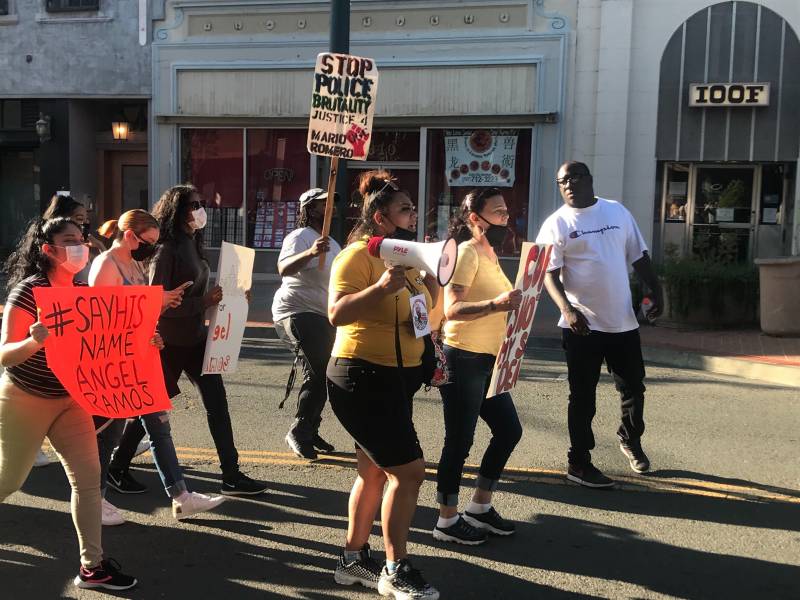David Harrison, cousin of Willie McCoy: “I’m elated. And it’s been hard at some points because I’ve been watching other people … talking bad about these kids and what they’re doing with the looting, and vandalism, and things like that, and they don’t understand that this stuff has to happen for us to have change. Because this is the only language that the powers in place that can make change recognize. Without that, nothing happens. It’s just ‘please go back to work. Back to business as usual.’ And more killing.”
On what feels different about these 2020 protests
Alicia Saddler: “In the past, like when others have been murdered by Vallejo police, we don’t come together. We don’t have that support from the community… And to see these hundreds and hundreds of people coming together, and marching for the same thing… Vallejo needed to come together, and be as one and show support to each other.”
David Harrison: “What is going on is something that we haven’t seen before … Now they got it on tape. ‘Cause we have been telling these stories the whole time about how we would be beaten, robbed, misused … being falsely accused of things and put in jail for things we didn’t do. And no one believed us because, you know, we was young black kids with a record.
“So, yeah, it is different now because now kids are really woke… they’ve seen this in so many videos. A lot of people maybe say, ‘well, they’re desensitized to these videos because there’s so many of them’ but no: they’re not desensitized, they’re hypnotized … because every time that they see a red and blue light, or hear a siren, they fear for their lives.”
On the momentum of the recent protest movement
David Harrison: “These kids are fearless, they’re not scared … they’re not afraid of death because they are looking at it like their hope is hopeless. If we stay in this condition, we’re going to die anyway.”
Alicia Saddler: “Every time there is something that’s going on in Vallejo, the numbers get bigger instead of smaller, you know? Sometimes it’s like stuff happens, and then people are outraged, and then it starts to die down. And that’s not happening. It’s only getting bigger and bigger and bigger.”
David Harrison: “What I’m seeing now is that these governors are getting on television now talking about ‘they want swift justice.’ We’ve never seen that before. I think that things are gonna come to a head. They’re not even worried about the people. The system is worried about the property and the economics. And when our people are unified and organized, they stop the economical flow.”
On the emotional impact of losing a loved one to a police killing
Alicia Saddler: “I’ve just seen a video of George Floyd’s daughter … she was saying ‘my daddy changed the world.’ I broke down and cried because yes, baby: it’s not changed yet, but he is changing it. And it’s sad that it had to be her dad. And now she no longer has a dad, but yes, he did not die in vain, and that’s for sure.”
David Harrison: “I have [Willie’s] picture and his urn there, and I talk to him, next to my television set on my nightstand … I tell him that ‘we’re finally going to get some justice, finally. They’re going to … prosecute some of these cops, and the ones that did this to you — they’re not going to get away with it.’”
Click the episode links below to read and hear The Bay’s three-part series about policing in Vallejo
Episode 1
Episode 2
Episode 3

